You are hereBlogs / WcP.Scientific.Mind's blog / Inventors in 800mi car race run on wood chips, cow dung, veg oil, no gas! Jagged Sierra Nevada, bleak flatness of Death Valley
Inventors in 800mi car race run on wood chips, cow dung, veg oil, no gas! Jagged Sierra Nevada, bleak flatness of Death Valley

(quote)
Wayne Keith, a hay farmer from Springville, Ala. (population 3,000), pulled into Berkeley last week driving a lime-green pickup truck that runs mostly on wood chips but sometimes cow dung, too. Keith, who wore dirt-flecked overalls and a trucker's cap, was in town to compete in the first Escape from Berkeley race, a kind of mini Cannonball Run to Las Vegas for drivers of vehicles that run on anything but petroleum. Two other racers relied on vegetable oil, one on alcohol and one on steam power to run his carriage (mostly for show; after a few miles, it was put on a trailer to traverse some of the dicier terrain).
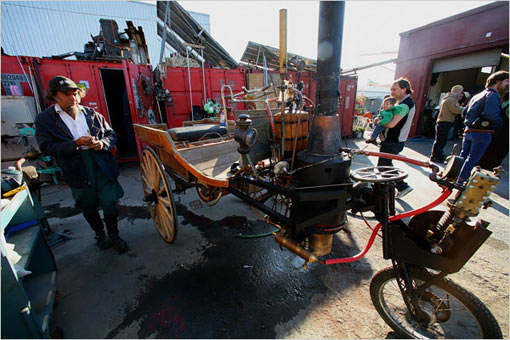
Contestants in the three-day race starting Oct. 11, were tempted by the $5,000 purse - awarded to the team reaching the Sahara Hotel and Casino valet parking area first, about 600 miles away - but most seemed equally pleased to show off their inventions to the public. They also wanted to see if their vehicles could withstand the jagged topography of the Sierra Nevada and the bleak flatness of Death Valley. "I haven't paid for gas in three years," Keith said, looking at the bags of wood scraps he had collected for free from a shutter company in Lubbock, Texas. "I'd like to win the race, sure, but the real incentive is to show people the technology works."
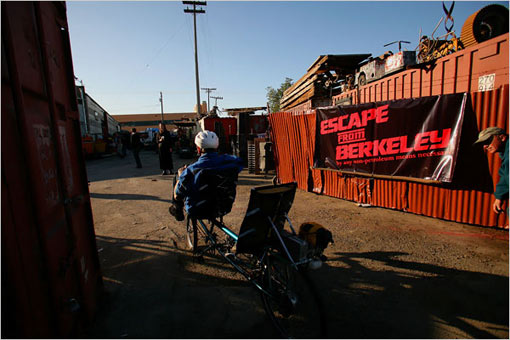
Craig Reece, owner of Berkeley's PlantDrive, one of the largest retailers of diesel engine converter kits, estimates that between 100,000 and 300,000 people in the United States now drive on vegetable oil, a tiny fraction of cars on the road. More than 250 million passenger cars were registered in 2006, according to the U.S. Department of Transportation. Fred Benoit, a representative for the Massachusetts-based Grease Car company, which sells conversion kits to run engines on grease, said retail sales of the kits rose dramatically in the spring (along with gas prices), yet the average American is still not ready to convert his car. "Running off grease isn't as easy as pulling up to a station, filling up and driving away," Benoit said. "It's a commitment, and most Americans want their convenience - we're just not there yet."
Back in Berkeley, the youngest racer, 16-year-old Calund Llaguno from San Diego, arrived at the starting line in a 1984 maroon Mercedes-Benz 300SD. He was dressed snazzily in suit and tie and topped that off with a shaded racing helmet in honor of the anonymous test driver The Stig on the British TV show "Top Gear." The teenager converted the Benz diesel engine to run off vegetable oil with the help of his father, Lundy Llaguno, who also wore a suit and was required to sit shotgun to help his son complete the remaining 25 hours of his learner's permit. "My son's idea was to dress racing-classy," Lundy Llaguno said of their apparel after the race was completed. "But by the time we were oily, we had to ditch that (idea)."
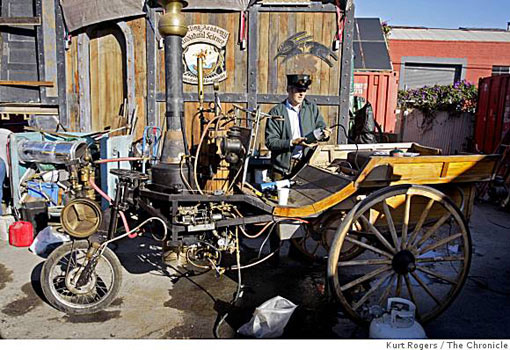
As in the 1981 Burt Reynolds flick "The Cannonball Run," mechanical difficulties delayed the three-day journey. Of the 10 teams that signed up, only seven made it to Berkeley able to actually race, and just five got off the starting line. The motorcycle team had trouble with its gasifier system; the solar-powered bike team had gear and brake failures; and a Volkswagen van, also rejiggered for gasification, leaked potentially toxic amounts of carbon monoxide back into the car.
But imperfections are the lot of DIY energy culture. Its adherents know that finding a solution to petroleum is messy business. "It's part of the event's point," said Jessica Hobbs, the organizer and a member of Shipyard Labs, an artists' colony in Berkeley that turned into an alternative-energy colony when the city shut off its power in 2001 in an attempt to force them out. The artisans, looking to power their industrial space, quickly became experts in alt-energy. "A lot of the innovation in this field is coming from people hacking away in their garages, trying new things."
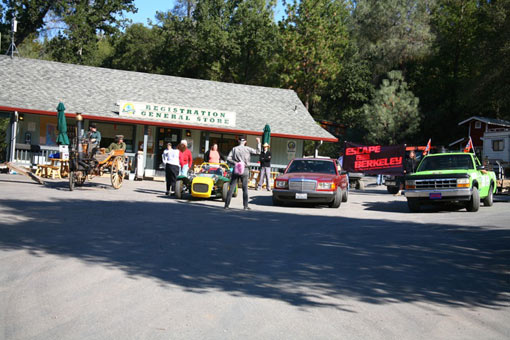
Somewhere before Mono Lake, Lundy Llaguno reported that the Mercedes slowed to 45 mph. The chilly temperature had coagulated the vegetable oil, gumming up the tubes; Lundy said the contents of the main tank had jelled and looked like a thick vinaigrette dressing with speckles of fat. The father-and-son team had to reroute the tubes on the fly to keep the oil warm and flowing, purportedly using a Paul Newman's grape juice container and "a whole lot of zip-ties and duct tape" to solve the problem.
The Mercedes is Calund's first car, and he nicknamed the luxury ride "the Merc," short for "Mercedes," but also because "it acts like a mercenary. If you don't pay it - or if you neglect it - it acts up on you and doesn't work." In the end, the delays cost the team valuable time; they had been the pre-race favorite to win, but arrived in third place. It didn't cost a dime to fill their tank, Lundy Llaguno noted. The two picked up donated oil from churches, restaurants and friends along the route.
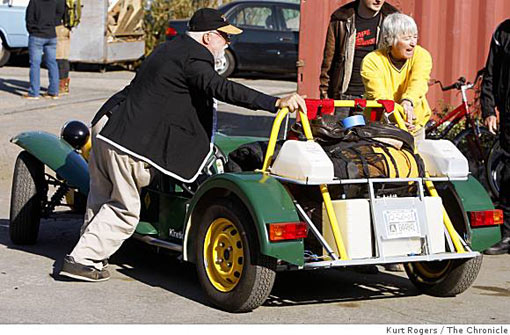
Keith, the hay farmer, used about 600 pounds of wood scrap, spending what amounted to 1 cent per mile, he said. A blown tire helped Keith place second. Another team, which styled its Lotus Seven roadster after the '60s television show "The Prisoner," had fewer technical glitches and reached the finish line three hours ahead of Keith's pickup.
The winners were Jack McCornack and Sharon Westcott from Cave Junction, Ore., who zipped along at a top speed of 72 mph and used 12 gallons of top-shelf canola oil to reach Las Vegas in a total of 1,418 minutes. "The truth is, we decided to join the race before we read the fine print and knew there was even a prize," McCornack said. "We were inspired by efficiency."

The event’s organizers include Jim Mason, founder of a 20,000-square-foot open-air garage in Berkeley called Shipyard Labs where self-described “geeks and gearheads” work in shipping containers. Mr. Mason chose Las Vegas to complete the race largely out of contempt for the tourist destination, he said. “Vegas is a place of excessive spectacle and consumption of other peoples creativity,” he said. “This isn’t a place of production, of citizens making, expressing, creating....Vegas is the biggest contradiction of what we just did.” Next year’s race, he said, will be held over Memorial Day weekend and will conclude in Mexico.
(unquote)
Photos courtesy of Kurt Rogers / The Chronicle, Steve Friess & Jim Wilson / The New York Times, and escapefromberkeley.com
Original Source: SF Chronicle and NY Times (with Image Gallery)
Related Articles: Veggie-Oil Lotus Wins Alt-Fuel Race to Vegas, Breaking News: MAX Wins Escape from Berkeley!, and From Berkeley to Vegas on one gallon of gas
Official Site: Escape From Berkeley (by any non-petroleum mean necessary)



















I am so amazed by this cute, small lime-green https://www.stylintrucks.com/">pickup truck that is canola oil powered. I like the idea of the competition having vehicles run by vegetable oil, alcohol etc. Congrats to the winners. I'd love to ride in one of those creations.